Nursing Mental Issues of a Patient
VerifiedAdded on 2022/12/28
|8
|2719
|439
AI Summary
I was advised on my previous assignments that there were grammatical errors and false referencing. please look into that matter. thanks.
Contribute Materials
Your contribution can guide someone’s learning journey. Share your
documents today.
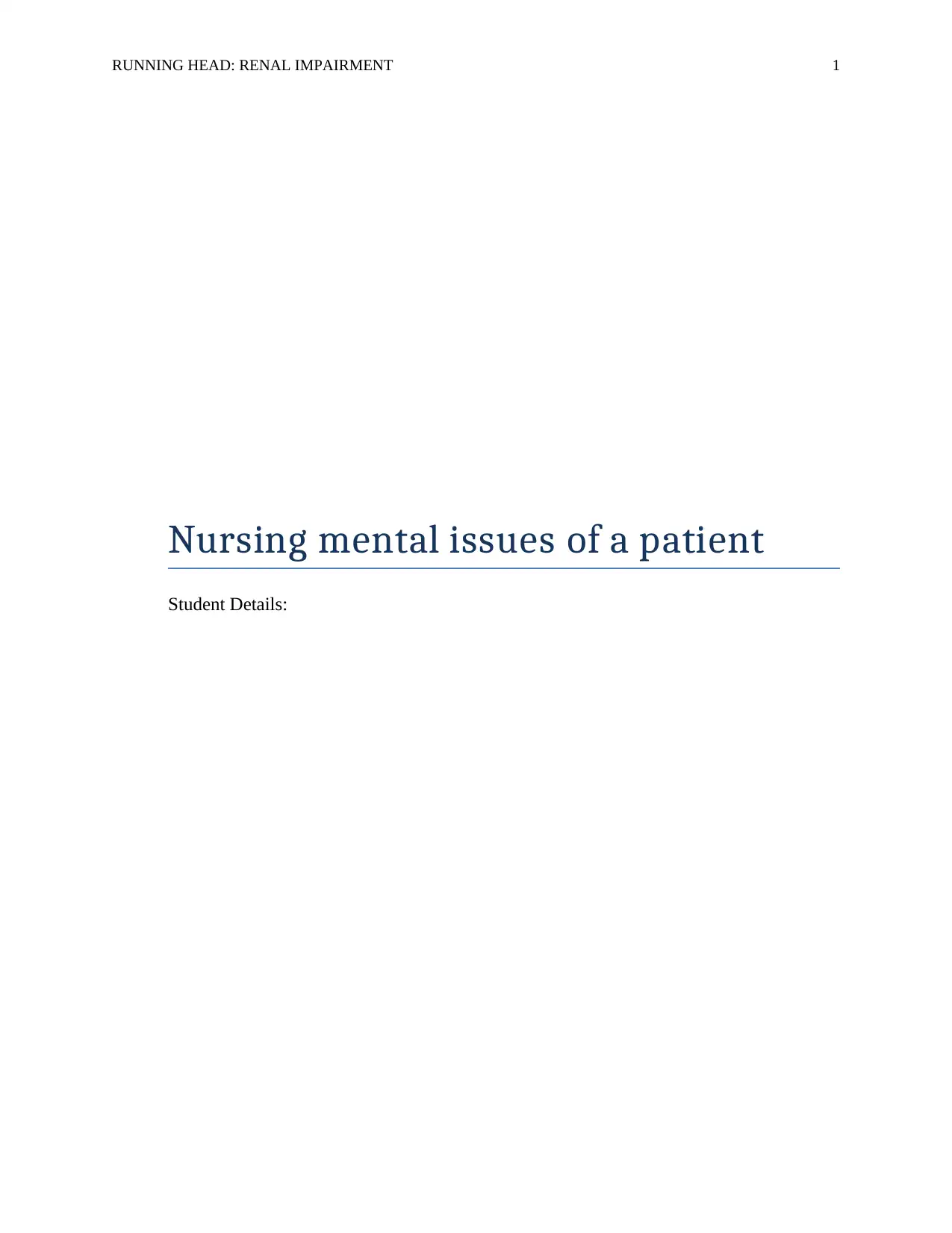
RUNNING HEAD: RENAL IMPAIRMENT 1
Nursing mental issues of a patient
Student Details:
Nursing mental issues of a patient
Student Details:
Secure Best Marks with AI Grader
Need help grading? Try our AI Grader for instant feedback on your assignments.
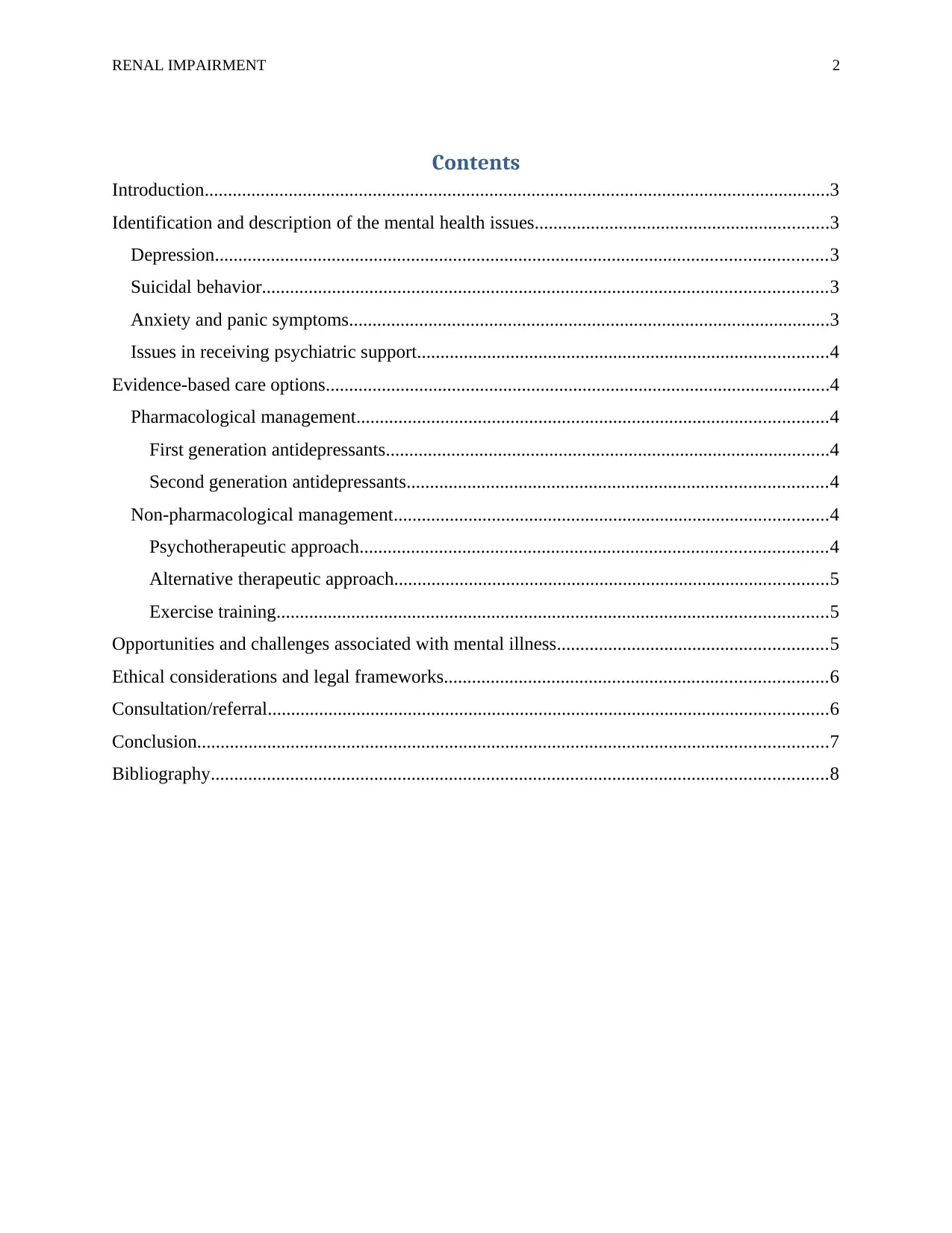
RENAL IMPAIRMENT 2
Contents
Introduction......................................................................................................................................3
Identification and description of the mental health issues...............................................................3
Depression...................................................................................................................................3
Suicidal behavior.........................................................................................................................3
Anxiety and panic symptoms.......................................................................................................3
Issues in receiving psychiatric support........................................................................................4
Evidence-based care options............................................................................................................4
Pharmacological management.....................................................................................................4
First generation antidepressants...............................................................................................4
Second generation antidepressants..........................................................................................4
Non-pharmacological management.............................................................................................4
Psychotherapeutic approach....................................................................................................4
Alternative therapeutic approach.............................................................................................5
Exercise training......................................................................................................................5
Opportunities and challenges associated with mental illness..........................................................5
Ethical considerations and legal frameworks..................................................................................6
Consultation/referral........................................................................................................................6
Conclusion.......................................................................................................................................7
Bibliography....................................................................................................................................8
Contents
Introduction......................................................................................................................................3
Identification and description of the mental health issues...............................................................3
Depression...................................................................................................................................3
Suicidal behavior.........................................................................................................................3
Anxiety and panic symptoms.......................................................................................................3
Issues in receiving psychiatric support........................................................................................4
Evidence-based care options............................................................................................................4
Pharmacological management.....................................................................................................4
First generation antidepressants...............................................................................................4
Second generation antidepressants..........................................................................................4
Non-pharmacological management.............................................................................................4
Psychotherapeutic approach....................................................................................................4
Alternative therapeutic approach.............................................................................................5
Exercise training......................................................................................................................5
Opportunities and challenges associated with mental illness..........................................................5
Ethical considerations and legal frameworks..................................................................................6
Consultation/referral........................................................................................................................6
Conclusion.......................................................................................................................................7
Bibliography....................................................................................................................................8
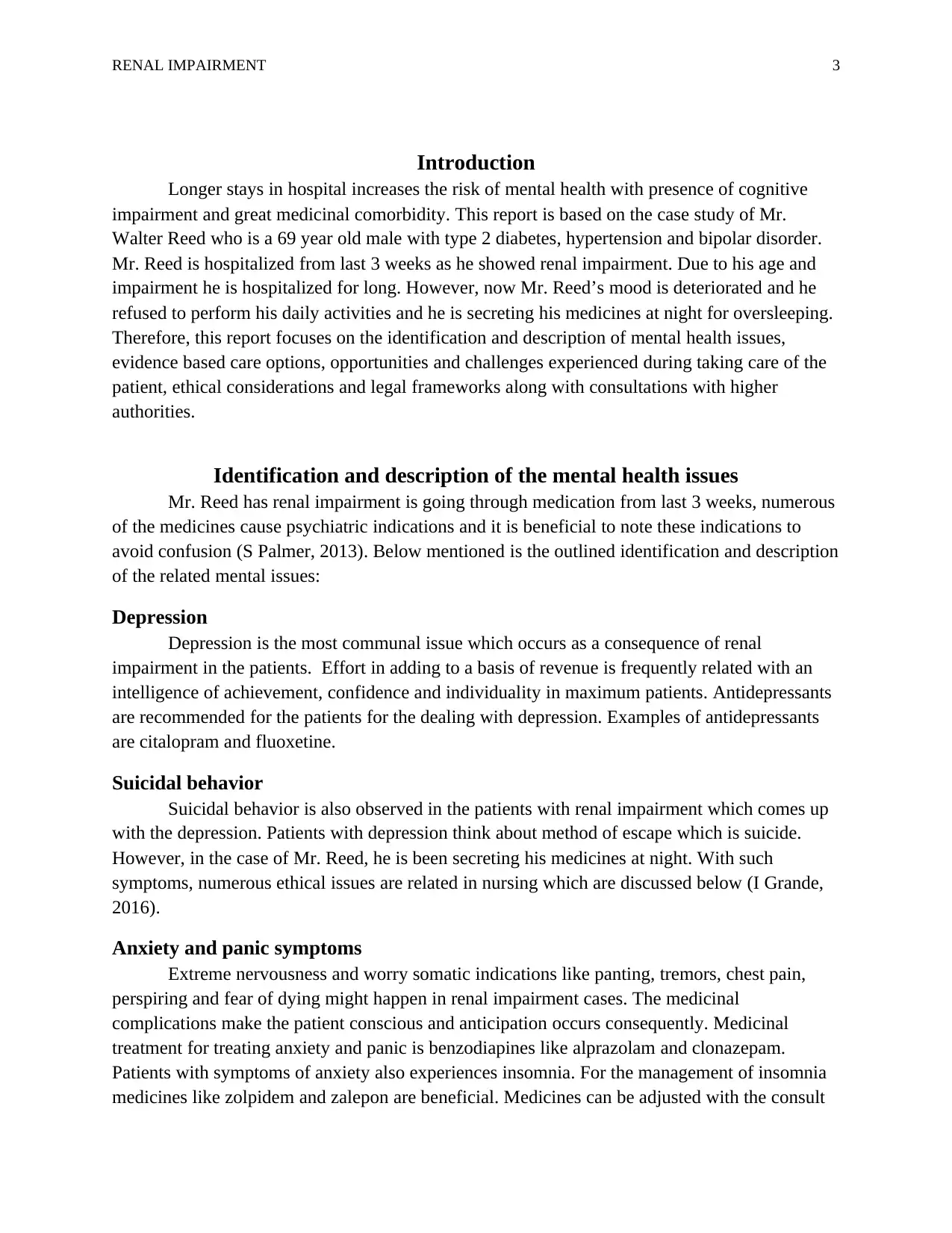
RENAL IMPAIRMENT 3
Introduction
Longer stays in hospital increases the risk of mental health with presence of cognitive
impairment and great medicinal comorbidity. This report is based on the case study of Mr.
Walter Reed who is a 69 year old male with type 2 diabetes, hypertension and bipolar disorder.
Mr. Reed is hospitalized from last 3 weeks as he showed renal impairment. Due to his age and
impairment he is hospitalized for long. However, now Mr. Reed’s mood is deteriorated and he
refused to perform his daily activities and he is secreting his medicines at night for oversleeping.
Therefore, this report focuses on the identification and description of mental health issues,
evidence based care options, opportunities and challenges experienced during taking care of the
patient, ethical considerations and legal frameworks along with consultations with higher
authorities.
Identification and description of the mental health issues
Mr. Reed has renal impairment is going through medication from last 3 weeks, numerous
of the medicines cause psychiatric indications and it is beneficial to note these indications to
avoid confusion (S Palmer, 2013). Below mentioned is the outlined identification and description
of the related mental issues:
Depression
Depression is the most communal issue which occurs as a consequence of renal
impairment in the patients. Effort in adding to a basis of revenue is frequently related with an
intelligence of achievement, confidence and individuality in maximum patients. Antidepressants
are recommended for the patients for the dealing with depression. Examples of antidepressants
are citalopram and fluoxetine.
Suicidal behavior
Suicidal behavior is also observed in the patients with renal impairment which comes up
with the depression. Patients with depression think about method of escape which is suicide.
However, in the case of Mr. Reed, he is been secreting his medicines at night. With such
symptoms, numerous ethical issues are related in nursing which are discussed below (I Grande,
2016).
Anxiety and panic symptoms
Extreme nervousness and worry somatic indications like panting, tremors, chest pain,
perspiring and fear of dying might happen in renal impairment cases. The medicinal
complications make the patient conscious and anticipation occurs consequently. Medicinal
treatment for treating anxiety and panic is benzodiapines like alprazolam and clonazepam.
Patients with symptoms of anxiety also experiences insomnia. For the management of insomnia
medicines like zolpidem and zalepon are beneficial. Medicines can be adjusted with the consult
Introduction
Longer stays in hospital increases the risk of mental health with presence of cognitive
impairment and great medicinal comorbidity. This report is based on the case study of Mr.
Walter Reed who is a 69 year old male with type 2 diabetes, hypertension and bipolar disorder.
Mr. Reed is hospitalized from last 3 weeks as he showed renal impairment. Due to his age and
impairment he is hospitalized for long. However, now Mr. Reed’s mood is deteriorated and he
refused to perform his daily activities and he is secreting his medicines at night for oversleeping.
Therefore, this report focuses on the identification and description of mental health issues,
evidence based care options, opportunities and challenges experienced during taking care of the
patient, ethical considerations and legal frameworks along with consultations with higher
authorities.
Identification and description of the mental health issues
Mr. Reed has renal impairment is going through medication from last 3 weeks, numerous
of the medicines cause psychiatric indications and it is beneficial to note these indications to
avoid confusion (S Palmer, 2013). Below mentioned is the outlined identification and description
of the related mental issues:
Depression
Depression is the most communal issue which occurs as a consequence of renal
impairment in the patients. Effort in adding to a basis of revenue is frequently related with an
intelligence of achievement, confidence and individuality in maximum patients. Antidepressants
are recommended for the patients for the dealing with depression. Examples of antidepressants
are citalopram and fluoxetine.
Suicidal behavior
Suicidal behavior is also observed in the patients with renal impairment which comes up
with the depression. Patients with depression think about method of escape which is suicide.
However, in the case of Mr. Reed, he is been secreting his medicines at night. With such
symptoms, numerous ethical issues are related in nursing which are discussed below (I Grande,
2016).
Anxiety and panic symptoms
Extreme nervousness and worry somatic indications like panting, tremors, chest pain,
perspiring and fear of dying might happen in renal impairment cases. The medicinal
complications make the patient conscious and anticipation occurs consequently. Medicinal
treatment for treating anxiety and panic is benzodiapines like alprazolam and clonazepam.
Patients with symptoms of anxiety also experiences insomnia. For the management of insomnia
medicines like zolpidem and zalepon are beneficial. Medicines can be adjusted with the consult
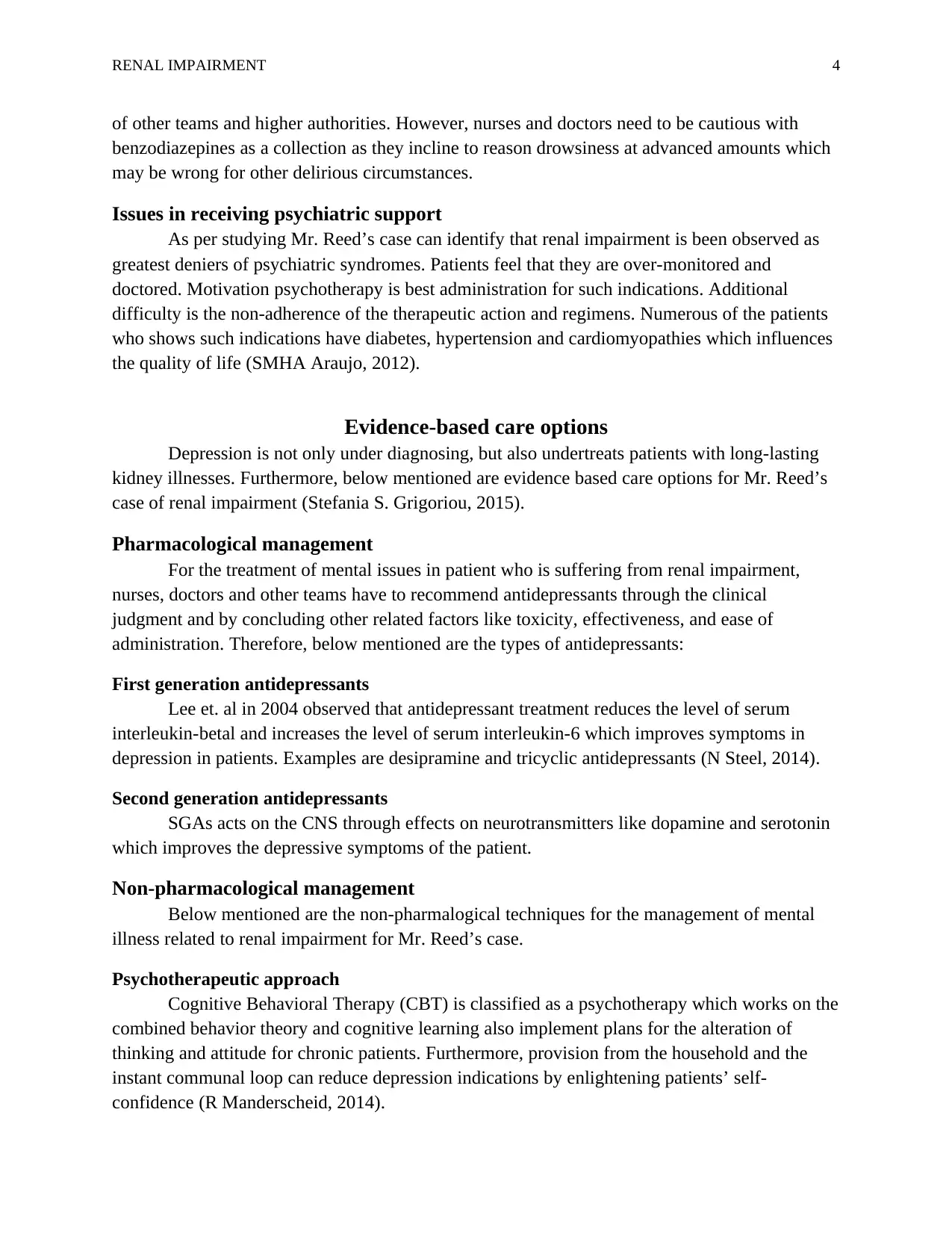
RENAL IMPAIRMENT 4
of other teams and higher authorities. However, nurses and doctors need to be cautious with
benzodiazepines as a collection as they incline to reason drowsiness at advanced amounts which
may be wrong for other delirious circumstances.
Issues in receiving psychiatric support
As per studying Mr. Reed’s case can identify that renal impairment is been observed as
greatest deniers of psychiatric syndromes. Patients feel that they are over-monitored and
doctored. Motivation psychotherapy is best administration for such indications. Additional
difficulty is the non-adherence of the therapeutic action and regimens. Numerous of the patients
who shows such indications have diabetes, hypertension and cardiomyopathies which influences
the quality of life (SMHA Araujo, 2012).
Evidence-based care options
Depression is not only under diagnosing, but also undertreats patients with long-lasting
kidney illnesses. Furthermore, below mentioned are evidence based care options for Mr. Reed’s
case of renal impairment (Stefania S. Grigoriou, 2015).
Pharmacological management
For the treatment of mental issues in patient who is suffering from renal impairment,
nurses, doctors and other teams have to recommend antidepressants through the clinical
judgment and by concluding other related factors like toxicity, effectiveness, and ease of
administration. Therefore, below mentioned are the types of antidepressants:
First generation antidepressants
Lee et. al in 2004 observed that antidepressant treatment reduces the level of serum
interleukin-betal and increases the level of serum interleukin-6 which improves symptoms in
depression in patients. Examples are desipramine and tricyclic antidepressants (N Steel, 2014).
Second generation antidepressants
SGAs acts on the CNS through effects on neurotransmitters like dopamine and serotonin
which improves the depressive symptoms of the patient.
Non-pharmacological management
Below mentioned are the non-pharmalogical techniques for the management of mental
illness related to renal impairment for Mr. Reed’s case.
Psychotherapeutic approach
Cognitive Behavioral Therapy (CBT) is classified as a psychotherapy which works on the
combined behavior theory and cognitive learning also implement plans for the alteration of
thinking and attitude for chronic patients. Furthermore, provision from the household and the
instant communal loop can reduce depression indications by enlightening patients’ self-
confidence (R Manderscheid, 2014).
of other teams and higher authorities. However, nurses and doctors need to be cautious with
benzodiazepines as a collection as they incline to reason drowsiness at advanced amounts which
may be wrong for other delirious circumstances.
Issues in receiving psychiatric support
As per studying Mr. Reed’s case can identify that renal impairment is been observed as
greatest deniers of psychiatric syndromes. Patients feel that they are over-monitored and
doctored. Motivation psychotherapy is best administration for such indications. Additional
difficulty is the non-adherence of the therapeutic action and regimens. Numerous of the patients
who shows such indications have diabetes, hypertension and cardiomyopathies which influences
the quality of life (SMHA Araujo, 2012).
Evidence-based care options
Depression is not only under diagnosing, but also undertreats patients with long-lasting
kidney illnesses. Furthermore, below mentioned are evidence based care options for Mr. Reed’s
case of renal impairment (Stefania S. Grigoriou, 2015).
Pharmacological management
For the treatment of mental issues in patient who is suffering from renal impairment,
nurses, doctors and other teams have to recommend antidepressants through the clinical
judgment and by concluding other related factors like toxicity, effectiveness, and ease of
administration. Therefore, below mentioned are the types of antidepressants:
First generation antidepressants
Lee et. al in 2004 observed that antidepressant treatment reduces the level of serum
interleukin-betal and increases the level of serum interleukin-6 which improves symptoms in
depression in patients. Examples are desipramine and tricyclic antidepressants (N Steel, 2014).
Second generation antidepressants
SGAs acts on the CNS through effects on neurotransmitters like dopamine and serotonin
which improves the depressive symptoms of the patient.
Non-pharmacological management
Below mentioned are the non-pharmalogical techniques for the management of mental
illness related to renal impairment for Mr. Reed’s case.
Psychotherapeutic approach
Cognitive Behavioral Therapy (CBT) is classified as a psychotherapy which works on the
combined behavior theory and cognitive learning also implement plans for the alteration of
thinking and attitude for chronic patients. Furthermore, provision from the household and the
instant communal loop can reduce depression indications by enlightening patients’ self-
confidence (R Manderscheid, 2014).
Secure Best Marks with AI Grader
Need help grading? Try our AI Grader for instant feedback on your assignments.
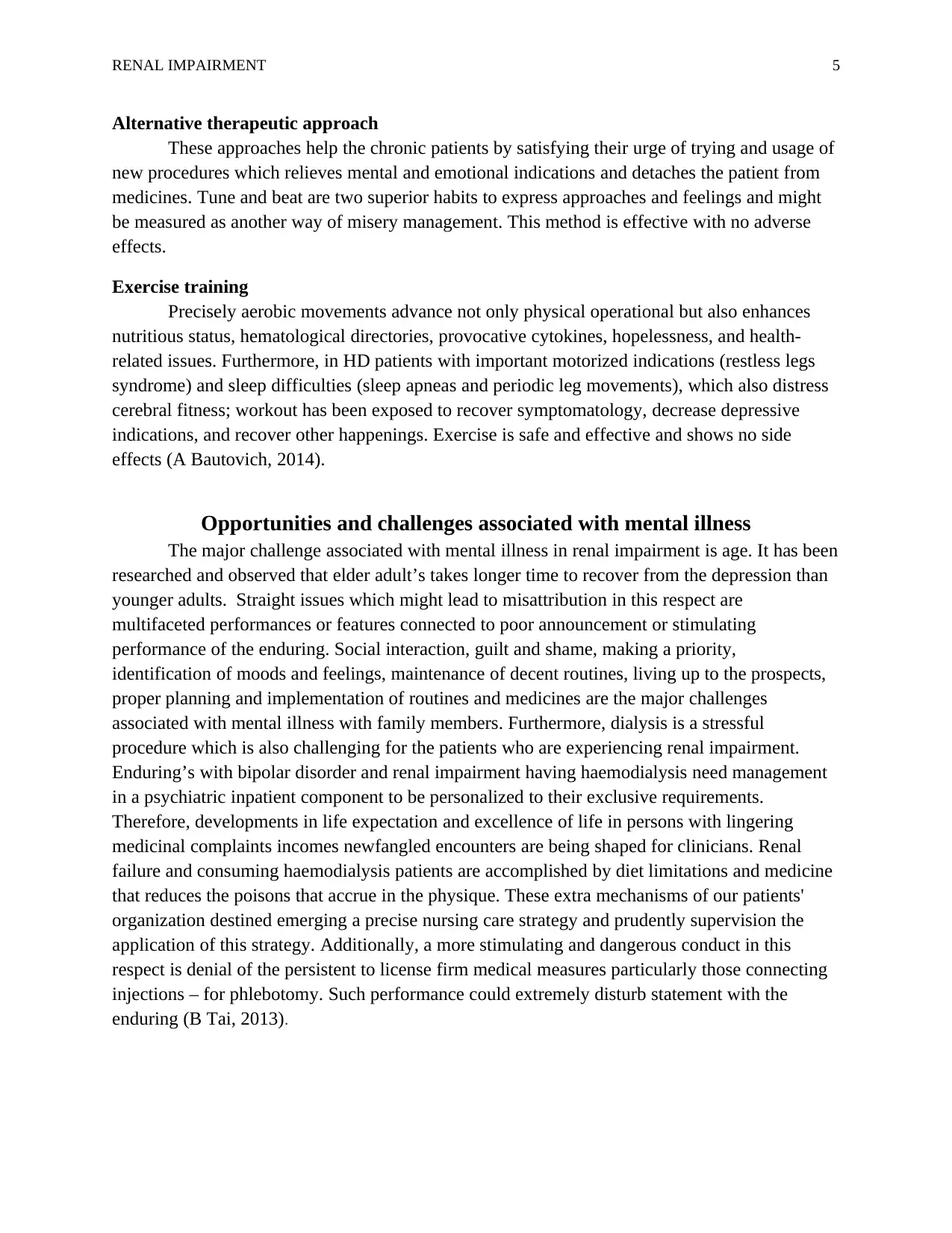
RENAL IMPAIRMENT 5
Alternative therapeutic approach
These approaches help the chronic patients by satisfying their urge of trying and usage of
new procedures which relieves mental and emotional indications and detaches the patient from
medicines. Tune and beat are two superior habits to express approaches and feelings and might
be measured as another way of misery management. This method is effective with no adverse
effects.
Exercise training
Precisely aerobic movements advance not only physical operational but also enhances
nutritious status, hematological directories, provocative cytokines, hopelessness, and health-
related issues. Furthermore, in HD patients with important motorized indications (restless legs
syndrome) and sleep difficulties (sleep apneas and periodic leg movements), which also distress
cerebral fitness; workout has been exposed to recover symptomatology, decrease depressive
indications, and recover other happenings. Exercise is safe and effective and shows no side
effects (A Bautovich, 2014).
Opportunities and challenges associated with mental illness
The major challenge associated with mental illness in renal impairment is age. It has been
researched and observed that elder adult’s takes longer time to recover from the depression than
younger adults. Straight issues which might lead to misattribution in this respect are
multifaceted performances or features connected to poor announcement or stimulating
performance of the enduring. Social interaction, guilt and shame, making a priority,
identification of moods and feelings, maintenance of decent routines, living up to the prospects,
proper planning and implementation of routines and medicines are the major challenges
associated with mental illness with family members. Furthermore, dialysis is a stressful
procedure which is also challenging for the patients who are experiencing renal impairment.
Enduring’s with bipolar disorder and renal impairment having haemodialysis need management
in a psychiatric inpatient component to be personalized to their exclusive requirements.
Therefore, developments in life expectation and excellence of life in persons with lingering
medicinal complaints incomes newfangled encounters are being shaped for clinicians. Renal
failure and consuming haemodialysis patients are accomplished by diet limitations and medicine
that reduces the poisons that accrue in the physique. These extra mechanisms of our patients'
organization destined emerging a precise nursing care strategy and prudently supervision the
application of this strategy. Additionally, a more stimulating and dangerous conduct in this
respect is denial of the persistent to license firm medical measures particularly those connecting
injections – for phlebotomy. Such performance could extremely disturb statement with the
enduring (B Tai, 2013).
Alternative therapeutic approach
These approaches help the chronic patients by satisfying their urge of trying and usage of
new procedures which relieves mental and emotional indications and detaches the patient from
medicines. Tune and beat are two superior habits to express approaches and feelings and might
be measured as another way of misery management. This method is effective with no adverse
effects.
Exercise training
Precisely aerobic movements advance not only physical operational but also enhances
nutritious status, hematological directories, provocative cytokines, hopelessness, and health-
related issues. Furthermore, in HD patients with important motorized indications (restless legs
syndrome) and sleep difficulties (sleep apneas and periodic leg movements), which also distress
cerebral fitness; workout has been exposed to recover symptomatology, decrease depressive
indications, and recover other happenings. Exercise is safe and effective and shows no side
effects (A Bautovich, 2014).
Opportunities and challenges associated with mental illness
The major challenge associated with mental illness in renal impairment is age. It has been
researched and observed that elder adult’s takes longer time to recover from the depression than
younger adults. Straight issues which might lead to misattribution in this respect are
multifaceted performances or features connected to poor announcement or stimulating
performance of the enduring. Social interaction, guilt and shame, making a priority,
identification of moods and feelings, maintenance of decent routines, living up to the prospects,
proper planning and implementation of routines and medicines are the major challenges
associated with mental illness with family members. Furthermore, dialysis is a stressful
procedure which is also challenging for the patients who are experiencing renal impairment.
Enduring’s with bipolar disorder and renal impairment having haemodialysis need management
in a psychiatric inpatient component to be personalized to their exclusive requirements.
Therefore, developments in life expectation and excellence of life in persons with lingering
medicinal complaints incomes newfangled encounters are being shaped for clinicians. Renal
failure and consuming haemodialysis patients are accomplished by diet limitations and medicine
that reduces the poisons that accrue in the physique. These extra mechanisms of our patients'
organization destined emerging a precise nursing care strategy and prudently supervision the
application of this strategy. Additionally, a more stimulating and dangerous conduct in this
respect is denial of the persistent to license firm medical measures particularly those connecting
injections – for phlebotomy. Such performance could extremely disturb statement with the
enduring (B Tai, 2013).
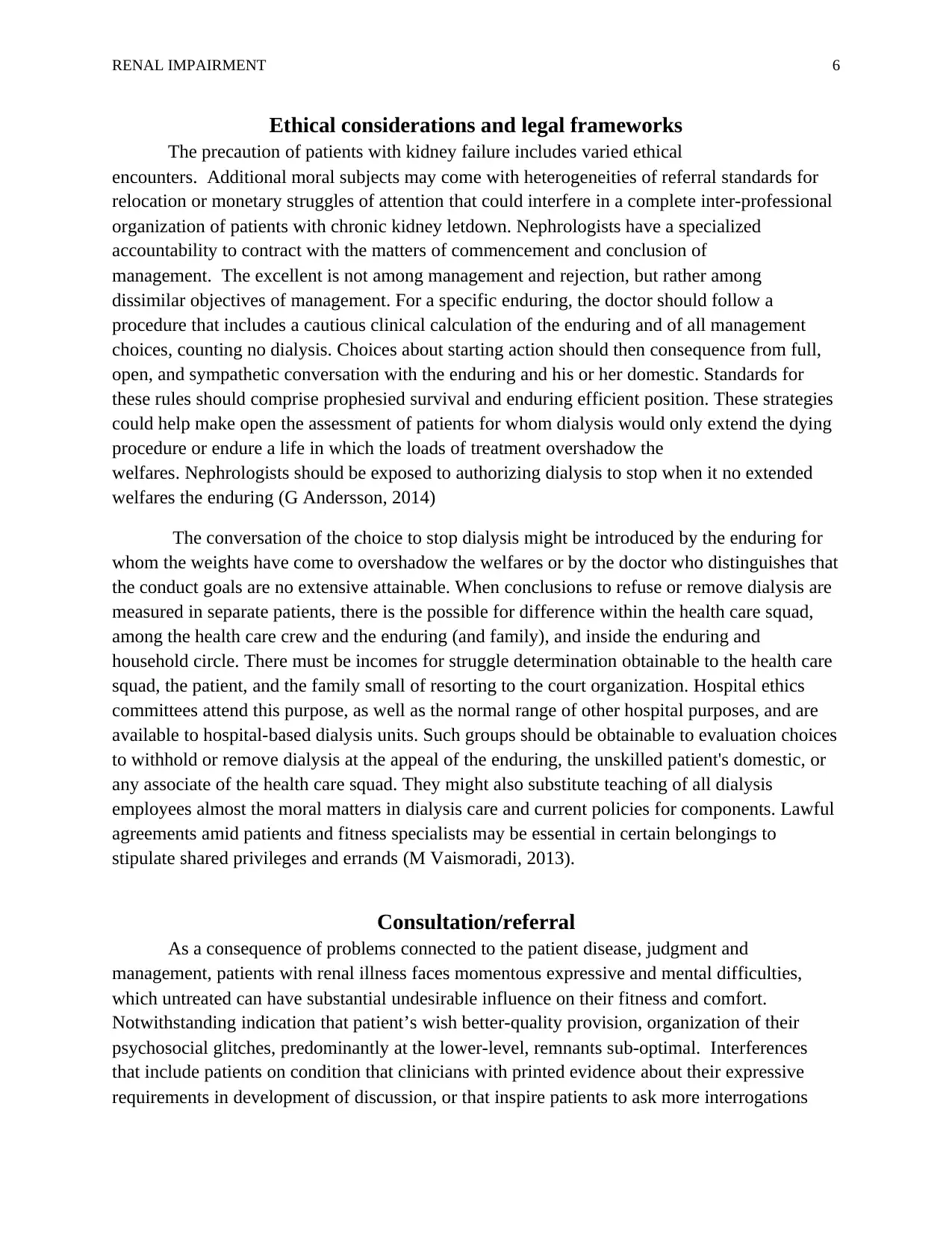
RENAL IMPAIRMENT 6
Ethical considerations and legal frameworks
The precaution of patients with kidney failure includes varied ethical
encounters. Additional moral subjects may come with heterogeneities of referral standards for
relocation or monetary struggles of attention that could interfere in a complete inter-professional
organization of patients with chronic kidney letdown. Nephrologists have a specialized
accountability to contract with the matters of commencement and conclusion of
management. The excellent is not among management and rejection, but rather among
dissimilar objectives of management. For a specific enduring, the doctor should follow a
procedure that includes a cautious clinical calculation of the enduring and of all management
choices, counting no dialysis. Choices about starting action should then consequence from full,
open, and sympathetic conversation with the enduring and his or her domestic. Standards for
these rules should comprise prophesied survival and enduring efficient position. These strategies
could help make open the assessment of patients for whom dialysis would only extend the dying
procedure or endure a life in which the loads of treatment overshadow the
welfares. Nephrologists should be exposed to authorizing dialysis to stop when it no extended
welfares the enduring (G Andersson, 2014)
The conversation of the choice to stop dialysis might be introduced by the enduring for
whom the weights have come to overshadow the welfares or by the doctor who distinguishes that
the conduct goals are no extensive attainable. When conclusions to refuse or remove dialysis are
measured in separate patients, there is the possible for difference within the health care squad,
among the health care crew and the enduring (and family), and inside the enduring and
household circle. There must be incomes for struggle determination obtainable to the health care
squad, the patient, and the family small of resorting to the court organization. Hospital ethics
committees attend this purpose, as well as the normal range of other hospital purposes, and are
available to hospital-based dialysis units. Such groups should be obtainable to evaluation choices
to withhold or remove dialysis at the appeal of the enduring, the unskilled patient's domestic, or
any associate of the health care squad. They might also substitute teaching of all dialysis
employees almost the moral matters in dialysis care and current policies for components. Lawful
agreements amid patients and fitness specialists may be essential in certain belongings to
stipulate shared privileges and errands (M Vaismoradi, 2013).
Consultation/referral
As a consequence of problems connected to the patient disease, judgment and
management, patients with renal illness faces momentous expressive and mental difficulties,
which untreated can have substantial undesirable influence on their fitness and comfort.
Notwithstanding indication that patient’s wish better-quality provision, organization of their
psychosocial glitches, predominantly at the lower-level, remnants sub-optimal. Interferences
that include patients on condition that clinicians with printed evidence about their expressive
requirements in development of discussion, or that inspire patients to ask more interrogations
Ethical considerations and legal frameworks
The precaution of patients with kidney failure includes varied ethical
encounters. Additional moral subjects may come with heterogeneities of referral standards for
relocation or monetary struggles of attention that could interfere in a complete inter-professional
organization of patients with chronic kidney letdown. Nephrologists have a specialized
accountability to contract with the matters of commencement and conclusion of
management. The excellent is not among management and rejection, but rather among
dissimilar objectives of management. For a specific enduring, the doctor should follow a
procedure that includes a cautious clinical calculation of the enduring and of all management
choices, counting no dialysis. Choices about starting action should then consequence from full,
open, and sympathetic conversation with the enduring and his or her domestic. Standards for
these rules should comprise prophesied survival and enduring efficient position. These strategies
could help make open the assessment of patients for whom dialysis would only extend the dying
procedure or endure a life in which the loads of treatment overshadow the
welfares. Nephrologists should be exposed to authorizing dialysis to stop when it no extended
welfares the enduring (G Andersson, 2014)
The conversation of the choice to stop dialysis might be introduced by the enduring for
whom the weights have come to overshadow the welfares or by the doctor who distinguishes that
the conduct goals are no extensive attainable. When conclusions to refuse or remove dialysis are
measured in separate patients, there is the possible for difference within the health care squad,
among the health care crew and the enduring (and family), and inside the enduring and
household circle. There must be incomes for struggle determination obtainable to the health care
squad, the patient, and the family small of resorting to the court organization. Hospital ethics
committees attend this purpose, as well as the normal range of other hospital purposes, and are
available to hospital-based dialysis units. Such groups should be obtainable to evaluation choices
to withhold or remove dialysis at the appeal of the enduring, the unskilled patient's domestic, or
any associate of the health care squad. They might also substitute teaching of all dialysis
employees almost the moral matters in dialysis care and current policies for components. Lawful
agreements amid patients and fitness specialists may be essential in certain belongings to
stipulate shared privileges and errands (M Vaismoradi, 2013).
Consultation/referral
As a consequence of problems connected to the patient disease, judgment and
management, patients with renal illness faces momentous expressive and mental difficulties,
which untreated can have substantial undesirable influence on their fitness and comfort.
Notwithstanding indication that patient’s wish better-quality provision, organization of their
psychosocial glitches, predominantly at the lower-level, remnants sub-optimal. Interferences
that include patients on condition that clinicians with printed evidence about their expressive
requirements in development of discussion, or that inspire patients to ask more interrogations
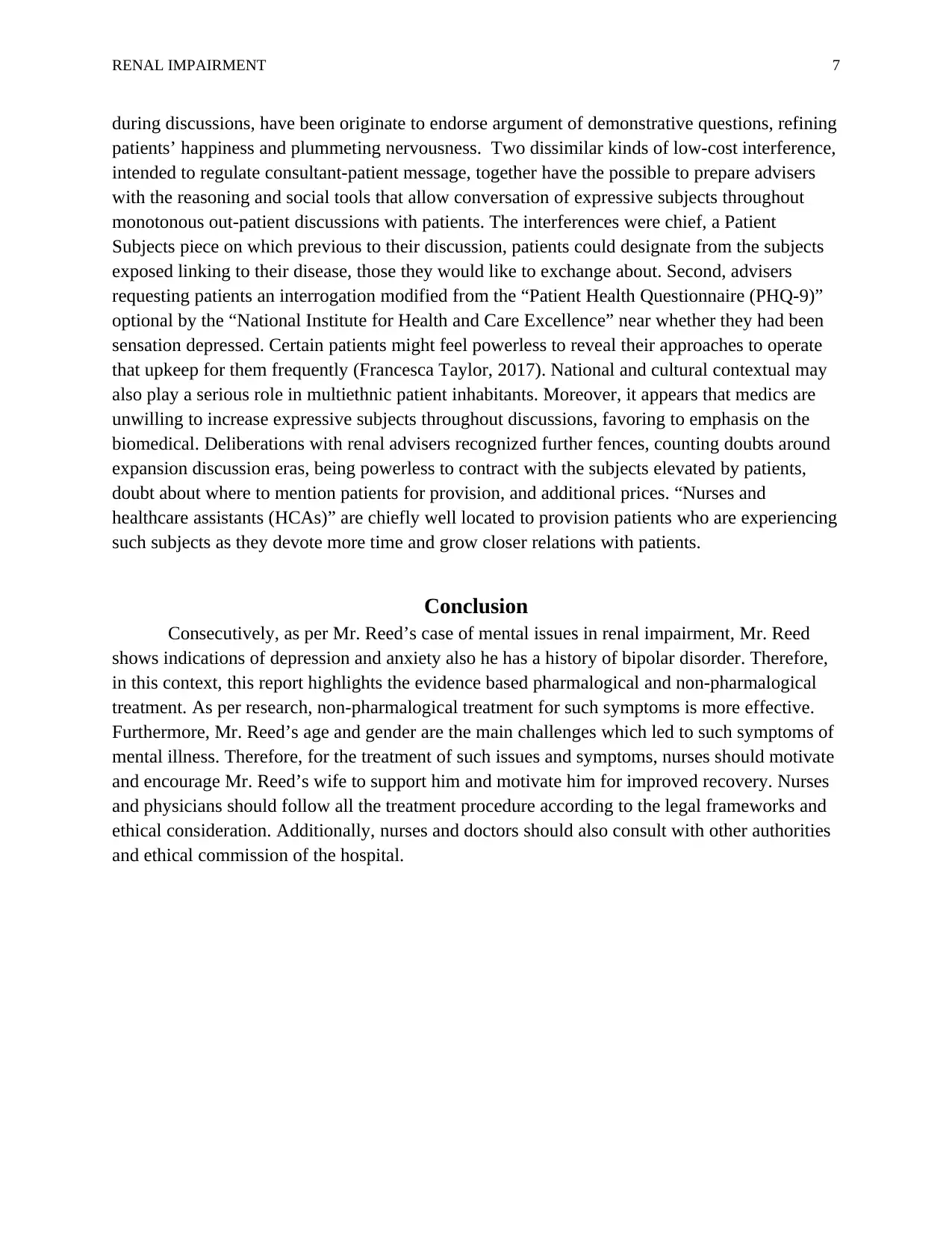
RENAL IMPAIRMENT 7
during discussions, have been originate to endorse argument of demonstrative questions, refining
patients’ happiness and plummeting nervousness. Two dissimilar kinds of low-cost interference,
intended to regulate consultant-patient message, together have the possible to prepare advisers
with the reasoning and social tools that allow conversation of expressive subjects throughout
monotonous out-patient discussions with patients. The interferences were chief, a Patient
Subjects piece on which previous to their discussion, patients could designate from the subjects
exposed linking to their disease, those they would like to exchange about. Second, advisers
requesting patients an interrogation modified from the “Patient Health Questionnaire (PHQ-9)”
optional by the “National Institute for Health and Care Excellence” near whether they had been
sensation depressed. Certain patients might feel powerless to reveal their approaches to operate
that upkeep for them frequently (Francesca Taylor, 2017). National and cultural contextual may
also play a serious role in multiethnic patient inhabitants. Moreover, it appears that medics are
unwilling to increase expressive subjects throughout discussions, favoring to emphasis on the
biomedical. Deliberations with renal advisers recognized further fences, counting doubts around
expansion discussion eras, being powerless to contract with the subjects elevated by patients,
doubt about where to mention patients for provision, and additional prices. “Nurses and
healthcare assistants (HCAs)” are chiefly well located to provision patients who are experiencing
such subjects as they devote more time and grow closer relations with patients.
Conclusion
Consecutively, as per Mr. Reed’s case of mental issues in renal impairment, Mr. Reed
shows indications of depression and anxiety also he has a history of bipolar disorder. Therefore,
in this context, this report highlights the evidence based pharmalogical and non-pharmalogical
treatment. As per research, non-pharmalogical treatment for such symptoms is more effective.
Furthermore, Mr. Reed’s age and gender are the main challenges which led to such symptoms of
mental illness. Therefore, for the treatment of such issues and symptoms, nurses should motivate
and encourage Mr. Reed’s wife to support him and motivate him for improved recovery. Nurses
and physicians should follow all the treatment procedure according to the legal frameworks and
ethical consideration. Additionally, nurses and doctors should also consult with other authorities
and ethical commission of the hospital.
during discussions, have been originate to endorse argument of demonstrative questions, refining
patients’ happiness and plummeting nervousness. Two dissimilar kinds of low-cost interference,
intended to regulate consultant-patient message, together have the possible to prepare advisers
with the reasoning and social tools that allow conversation of expressive subjects throughout
monotonous out-patient discussions with patients. The interferences were chief, a Patient
Subjects piece on which previous to their discussion, patients could designate from the subjects
exposed linking to their disease, those they would like to exchange about. Second, advisers
requesting patients an interrogation modified from the “Patient Health Questionnaire (PHQ-9)”
optional by the “National Institute for Health and Care Excellence” near whether they had been
sensation depressed. Certain patients might feel powerless to reveal their approaches to operate
that upkeep for them frequently (Francesca Taylor, 2017). National and cultural contextual may
also play a serious role in multiethnic patient inhabitants. Moreover, it appears that medics are
unwilling to increase expressive subjects throughout discussions, favoring to emphasis on the
biomedical. Deliberations with renal advisers recognized further fences, counting doubts around
expansion discussion eras, being powerless to contract with the subjects elevated by patients,
doubt about where to mention patients for provision, and additional prices. “Nurses and
healthcare assistants (HCAs)” are chiefly well located to provision patients who are experiencing
such subjects as they devote more time and grow closer relations with patients.
Conclusion
Consecutively, as per Mr. Reed’s case of mental issues in renal impairment, Mr. Reed
shows indications of depression and anxiety also he has a history of bipolar disorder. Therefore,
in this context, this report highlights the evidence based pharmalogical and non-pharmalogical
treatment. As per research, non-pharmalogical treatment for such symptoms is more effective.
Furthermore, Mr. Reed’s age and gender are the main challenges which led to such symptoms of
mental illness. Therefore, for the treatment of such issues and symptoms, nurses should motivate
and encourage Mr. Reed’s wife to support him and motivate him for improved recovery. Nurses
and physicians should follow all the treatment procedure according to the legal frameworks and
ethical consideration. Additionally, nurses and doctors should also consult with other authorities
and ethical commission of the hospital.
Paraphrase This Document
Need a fresh take? Get an instant paraphrase of this document with our AI Paraphraser
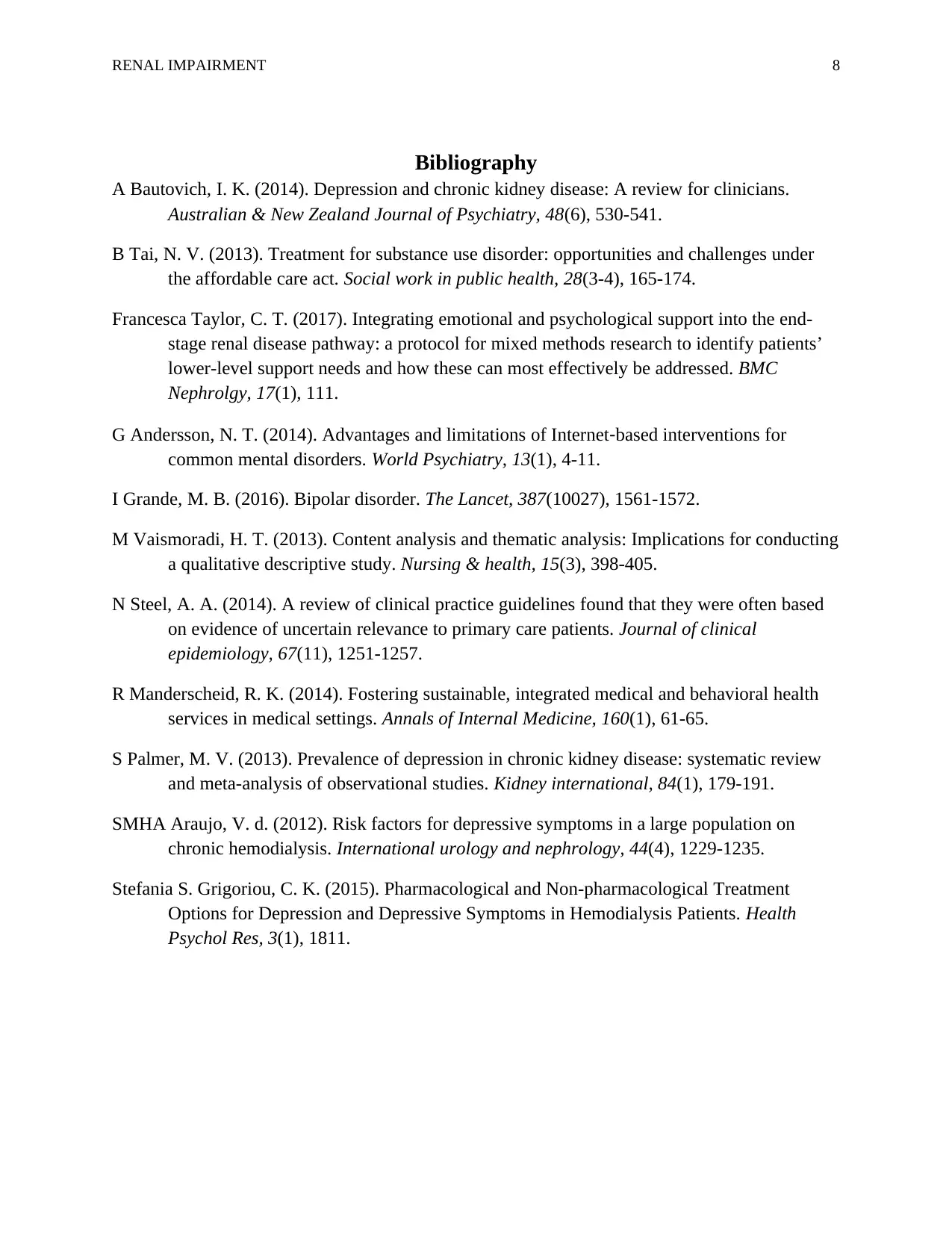
RENAL IMPAIRMENT 8
Bibliography
A Bautovich, I. K. (2014). Depression and chronic kidney disease: A review for clinicians.
Australian & New Zealand Journal of Psychiatry, 48(6), 530-541.
B Tai, N. V. (2013). Treatment for substance use disorder: opportunities and challenges under
the affordable care act. Social work in public health, 28(3-4), 165-174.
Francesca Taylor, C. T. (2017). Integrating emotional and psychological support into the end-
stage renal disease pathway: a protocol for mixed methods research to identify patients’
lower-level support needs and how these can most effectively be addressed. BMC
Nephrolgy, 17(1), 111.
G Andersson, N. T. (2014). Advantages and limitations of Internet‐based interventions for
common mental disorders. World Psychiatry, 13(1), 4-11.
I Grande, M. B. (2016). Bipolar disorder. The Lancet, 387(10027), 1561-1572.
M Vaismoradi, H. T. (2013). Content analysis and thematic analysis: Implications for conducting
a qualitative descriptive study. Nursing & health, 15(3), 398-405.
N Steel, A. A. (2014). A review of clinical practice guidelines found that they were often based
on evidence of uncertain relevance to primary care patients. Journal of clinical
epidemiology, 67(11), 1251-1257.
R Manderscheid, R. K. (2014). Fostering sustainable, integrated medical and behavioral health
services in medical settings. Annals of Internal Medicine, 160(1), 61-65.
S Palmer, M. V. (2013). Prevalence of depression in chronic kidney disease: systematic review
and meta-analysis of observational studies. Kidney international, 84(1), 179-191.
SMHA Araujo, V. d. (2012). Risk factors for depressive symptoms in a large population on
chronic hemodialysis. International urology and nephrology, 44(4), 1229-1235.
Stefania S. Grigoriou, C. K. (2015). Pharmacological and Non-pharmacological Treatment
Options for Depression and Depressive Symptoms in Hemodialysis Patients. Health
Psychol Res, 3(1), 1811.
Bibliography
A Bautovich, I. K. (2014). Depression and chronic kidney disease: A review for clinicians.
Australian & New Zealand Journal of Psychiatry, 48(6), 530-541.
B Tai, N. V. (2013). Treatment for substance use disorder: opportunities and challenges under
the affordable care act. Social work in public health, 28(3-4), 165-174.
Francesca Taylor, C. T. (2017). Integrating emotional and psychological support into the end-
stage renal disease pathway: a protocol for mixed methods research to identify patients’
lower-level support needs and how these can most effectively be addressed. BMC
Nephrolgy, 17(1), 111.
G Andersson, N. T. (2014). Advantages and limitations of Internet‐based interventions for
common mental disorders. World Psychiatry, 13(1), 4-11.
I Grande, M. B. (2016). Bipolar disorder. The Lancet, 387(10027), 1561-1572.
M Vaismoradi, H. T. (2013). Content analysis and thematic analysis: Implications for conducting
a qualitative descriptive study. Nursing & health, 15(3), 398-405.
N Steel, A. A. (2014). A review of clinical practice guidelines found that they were often based
on evidence of uncertain relevance to primary care patients. Journal of clinical
epidemiology, 67(11), 1251-1257.
R Manderscheid, R. K. (2014). Fostering sustainable, integrated medical and behavioral health
services in medical settings. Annals of Internal Medicine, 160(1), 61-65.
S Palmer, M. V. (2013). Prevalence of depression in chronic kidney disease: systematic review
and meta-analysis of observational studies. Kidney international, 84(1), 179-191.
SMHA Araujo, V. d. (2012). Risk factors for depressive symptoms in a large population on
chronic hemodialysis. International urology and nephrology, 44(4), 1229-1235.
Stefania S. Grigoriou, C. K. (2015). Pharmacological and Non-pharmacological Treatment
Options for Depression and Depressive Symptoms in Hemodialysis Patients. Health
Psychol Res, 3(1), 1811.
1 out of 8
Related Documents
Your All-in-One AI-Powered Toolkit for Academic Success.
+13062052269
info@desklib.com
Available 24*7 on WhatsApp / Email
![[object Object]](/_next/static/media/star-bottom.7253800d.svg)
Unlock your academic potential
© 2024 | Zucol Services PVT LTD | All rights reserved.





